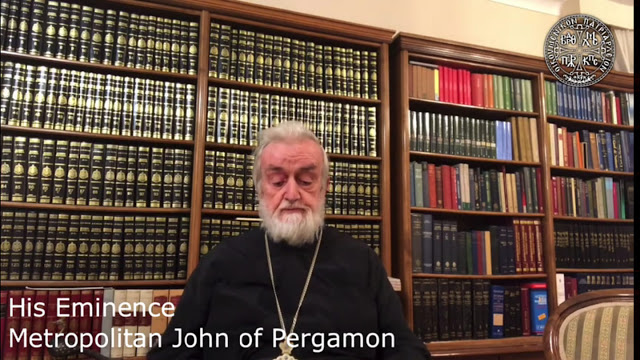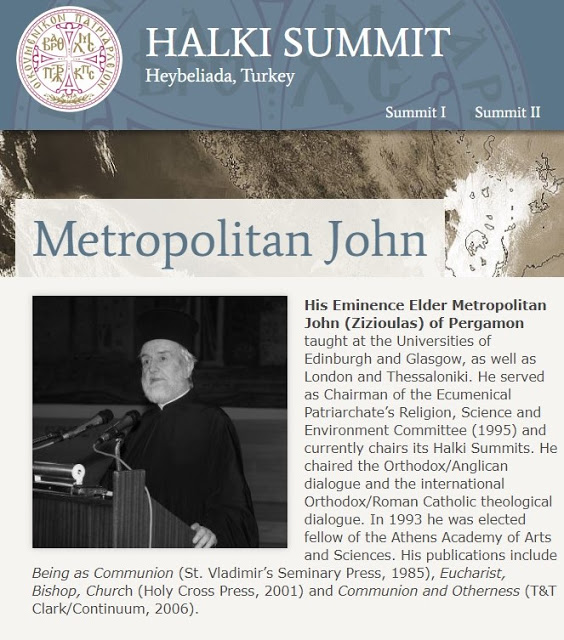
A Message by Metropolitan John of Pergamon
Second Webinar of Halki Summit IV – Importance of Science
January 27, 2021
* * *
I should like to begin by expressing my warmest thanks and congratulations to the organizers of this new Halki Summit, particularly Father John Chryssavgis and his collaborators, who, with the blessing of His All-Holiness, the Ecumenical Patriarch Bartholomew, continue and keep alive the long tradition of the Ecumenical Patriarchate’s initiatives for the protection of our only and irreplaceable home – God’s creation.
The circumstances in which the world community finds itself today with the Covid-19 pandemic are teaching us many lessons, and there is a wide discussion going on about the causes and the effects of this situation. Allow me to concentrate on the following points:
1. The present pandemic is not unrelated to the ecological crisis. It has been pointed out by specialists on ecology that the destruction of forests for the purpose of cultivating land in order to increase food production has released viruses from their natural environment and brought them into contact with the human organism which is now striving to cope with them. We are, thus, warned that epidemics or pandemics of this kind are to be expected even in the near future as long as the present way of agriculture and food production continues. We are learning, therefore, unfortunately not theoretically but by costly experience, that our unlimited exploitation of nature for the sake of economic growth can have catastrophic consequences for humanity itself. The elevation of economic growth to the highest ideal in our modern societies is upsetting the peaceful co-existence of the various natural species – a co-existence built by millions of years of natural evolution. We are thus reminded, alas with a heavy cost, that we are not masters and proprietors of nature but called by God to protect and cultivate it by respecting its laws and its integrity, and honoring its Creator.
2. The second lesson from the pandemic has to do with the limits of science. It is not only economics but also natural and medical sciences that are to a great extent responsible for the disturbance of humanity’s relationship with nature. I am not referring to widespread and unproved rumors that the coronavirus was the result of laboratory experiments. What I have in mind is the biotechnological interventions into nature, verging on the boundaries of species and threatening their variety and their right to existence. Science is often giving the impression that it operates as if the rest of nature existed simply in order to serve the needs of humanity. The present pandemic teaches us that even a small and almost invisible natural element can challenge this assumption. The rights and power of science have their limits.
It is at this point that probably the most difficult lesson from the pandemic emerges. Scientists are heard to be saying today that the coronavirus will certainly be defeated because science possesses the means to do that. The vaccine is presented as the solution to the problem. But what about after the vaccine? If we continue treating nature in the way we do, humanity will be called again to pay the same high toll of millions of deaths and new economic crises. Science by itself cannot prevent this from happening. It is only our healthy relationship with nature that may help us to avoid it. And this will require an ethos stemming form the faith that nature is not our property. Religion cannot become redundant without a heavy cost.
3. The third point that emerges as a lesson of the pandemic is addressed to religion. The pandemic did not reveal tendencies of self-sufficiency only in science. It has brought out also a tendency of religion to disregard science, and this constitutes an equally serious problem. We have been observing the phenomenon of a great number of religious believers who doubt and disregard scientific data and advice refusing to wear masks and be vaccinated, while theories of conspiracy against religion are spreading and thriving all over the world. Where does this anti-science hysteria, costing human lives, come from? This is a broader issue which sociologists and historians of culture will have to investigate. As far as religion is concerned, the pandemic has brought to the surface a long-standing need for dialogue between religion and science, which would help each side to appreciate the other’s role and significance. An attempt at such a dialogue was initiated by the Ecumenical Patriarchate in connection with the ecological problem some years ago with a series of symposia, which promised to bear fruit. The current pandemic is teaching us that religion must respect scientific findings and advice, and science must learn that truth and life cannot be imprisoned or exhausted in the scientific laboratory.
Dear friends,
The human being does not always learn from crises, and the tendency is usually to return to old habits as soon as a crisis is over. What it is hoped that we shall learn from the present pandemic is, among other things, that the dilemma “economy versus health”, which seems to pre-occupy and torment politicians all over the world today, not knowing to which of the two sides they should give priority, relates to the fact that economic growth has been so absolutized in our culture that people are unwilling and unprepared to lower their living standards even when their health is at stake, let alone the survival of our natural environment. (In fact, our health is now dependent on our economic standards). Thus, as soon as the expected Messiah of the vaccine arrives – and we are certainly grateful to science for that – we shall hurry back to our old habits maximilizing our economic prosperity at the expense of nature, and perhaps of our health, too. And then, when a new epidemic comes, we shall be looking again for the arrival of a new vaccine to save us, making science into religion, humanity’s only hope.
This appears now to be a predetermined course for the future, unless the current crisis teaches us the lesson of tempering our greed and egocentricism that lie at the roots of our problems. Unless we learn to cherish more other values in our life, which the pandemic has taken away from us, such as personal contact and communion, loving relationships that count more than material goods, and a natural environment that we can share with others and bequeath to our children.
May the present pandemic prove to be a blessing in disguise, a teacher of the lessons we need to learn most.
Thank you.

